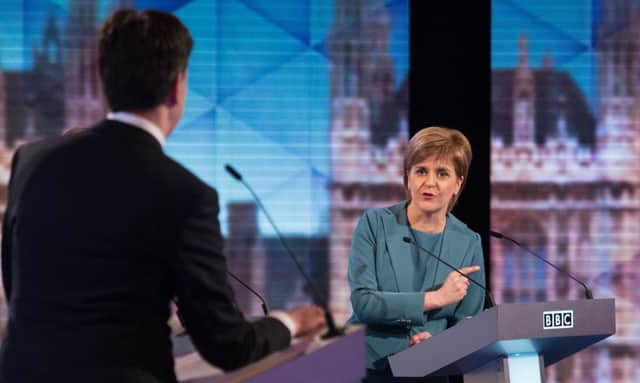John Curtice: Nicola Sturgeon again the star


However, he probably also hoped that the night would prove to be an internecine battle of the Left with Nicola Sturgeon, Leanne Wood and Natalie Bennett giving the Labour leader a hard time for not being radical enough.
At the beginning it looked as though this would be the dominant theme. In their opening statements the three female leaders all focused on the need for less austerity. Subsequently, in response to a claim from Mr Miliband that he represented a big change from the Conservatives, Nicola Sturgeon delivered one of the best lines of the night, arguing that the change Labour offered was too little and would be no more than a “Tory-lite” government. However, this theme then abated. While Mr Miliband and the three female leaders clearly took different positions on Trident, there was little heated debate about the issue – partly because Mr Miliband seemed concerned to take the opportunity to distance Labour from the war in Iraq and partly because he moved the subject on to Isis, an organisation that nobody was going to defend.
Advertisement
Hide AdAdvertisement
Hide AdOnly towards the end was Mr Miliband once again put under pressure for not being willing to embrace the more radical ideas of the Nationalists and the Greens. Once again his chief inquisitor was Nicola Sturgeon, undoubtedly the most effective performer of the night. She underlined her willingness to put Mr Miliband into Downing Street and “help Labour be bolder”. Miliband unsurprisingly rejected the offer but consequently he was left with the unanswered question of whether he would prefer Mr Cameron to remain in power rather than be helped himself into power by the SNP.
Not least of the reasons why the night did not prove any more difficult for Mr Miliband was the presence of Nigel Farage. The Ukip leader started confidently, pressing his immigration, Europe and anti-establishment buttons.
But he then made the mistake of attacking the audience and, with their sympathy lost, much of the middle of the programme saw Mr Farage on the receiving end of attacks from the other leaders, not least on housing and immigration. And for that, doubtless, Mr Cameron was duly grateful.
• John Curtice is professor of politics, Strathclyde University.
FOLLOW US
SCOTSMAN TABLET AND MOBILE APPS